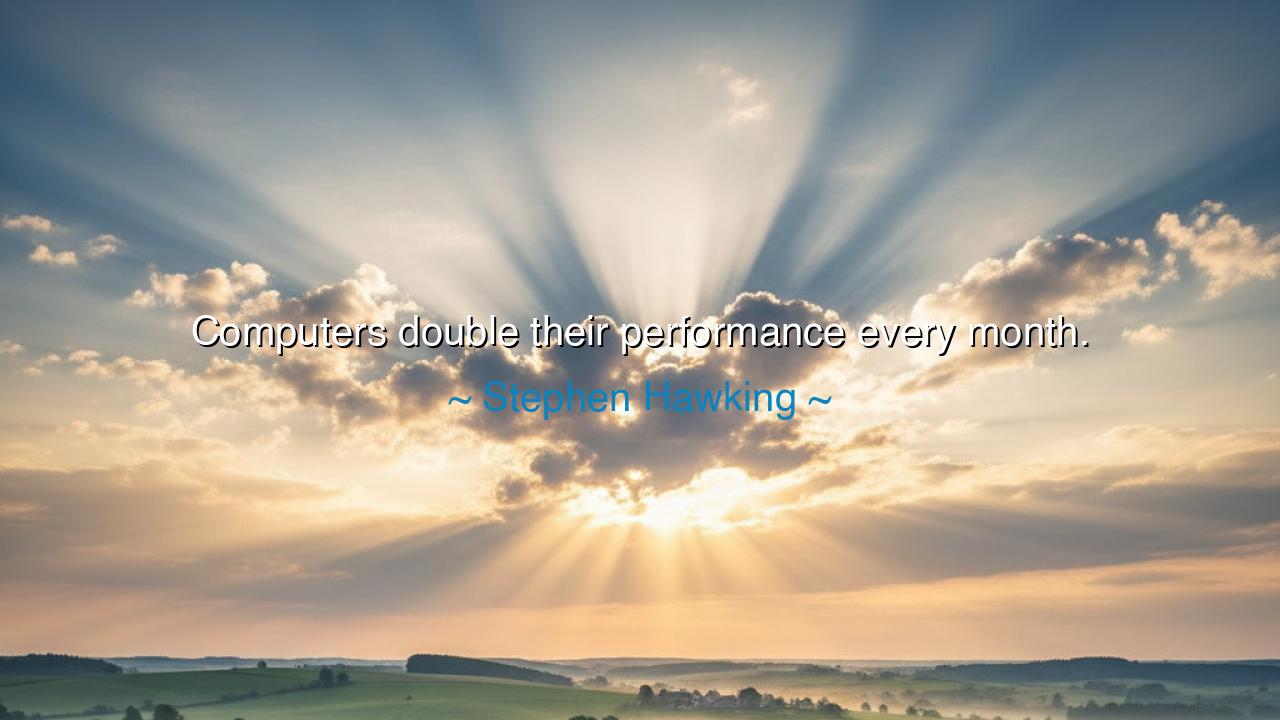
Computers double their performance every month.






The great physicist Stephen Hawking, whose mind reached beyond the stars, once declared: “Computers double their performance every month.” Though he spoke of circuits and code, his words carry the rhythm of prophecy. Beneath the surface of science lies a deeper truth—a truth about acceleration, transformation, and the relentless march of human ingenuity. Hawking did not merely observe the progress of machines; he witnessed the unfolding of a new kind of creation, where the intellect of man gave birth to a power that learns, grows, and surpasses its maker at an ever-swifter pace.
In the ancient world, progress was measured in centuries: the plow, the wheel, the written word—each a dawn that rose slowly over generations. But in our age, the dawns come like lightning. What once took a lifetime now takes a year; what once took a year, now takes a month. This is the meaning of Hawking’s vision: that technology evolves like life itself, governed by a new law of expansion—exponential, unstoppable, magnificent, and perilous. The doubling of computer performance is not just a measure of speed—it is the heartbeat of an era racing toward the unknown.
Consider the story of Alan Turing, who in the dark days of war built a machine to break the unbreakable code. His creation, primitive by today’s standards, was the seed of all modern computation. Yet even he, who glimpsed the soul of logic, could not have imagined that within a handful of decades, those machines would calculate billions of operations in the time it takes a man to blink. Hawking’s words echo Turing’s legacy—a reminder that the flame of discovery, once kindled, grows into a fire that consumes boundaries.
But in the wisdom of the ancients, every gift carries its shadow. The doubling of power is both blessing and trial. For as the machine grows stronger, so too must the soul grow wiser. To wield ever-greater force without greater understanding is to summon danger with one’s own hands. The builders of Babel sought to climb to heaven with their own invention, yet their tower fell—not because they lacked strength, but because they lacked humility. Thus, Hawking’s warning hums beneath his marvel: that we must match our technological ascent with moral and spiritual growth, lest our creation outpace our wisdom.
And yet, the story of humanity has always been the story of ascent. The same power that threatens also uplifts. The doubling of computer strength has opened the gates of medicine, art, communication, and knowledge to all who seek them. Diseases yield to pattern and prediction, distant hearts connect in an instant, and the sum of the world’s wisdom lies within the grasp of a child’s hand. The machine, once a servant, has become a mirror—reflecting both the brilliance and the blindness of its maker.
The lesson, then, is not to fear the speed of progress, but to rise with it. As the computer doubles in power, let the heart double in compassion; as algorithms learn faster, let humans learn deeper. The wise will not fight the tide of invention, but will steer it toward light. Let us become masters not by control, but by understanding—by knowing when to advance and when to pause, when to build and when to reflect. For the mightiest empire is not one of silicon, but of wisdom rightly applied.
So, children of the digital dawn, remember Hawking’s revelation: growth is no longer linear, but exponential. The machine’s acceleration mirrors the potential—and the peril—of the human spirit. Do not be dazzled by its speed, nor paralyzed by its power. Instead, learn to move with grace within its storm. For the true measure of progress is not how swiftly the world changes, but how steadfastly we remain human within that change.
In this, Hawking’s words are not a prediction but a call: to awaken, to balance, to build wisely. The machines may double their performance every month, but only the human soul can decide what that power shall serve—destruction or discovery, chaos or creation, darkness or light.






AAdministratorAdministrator
Welcome, honored guests. Please leave a comment, we will respond soon